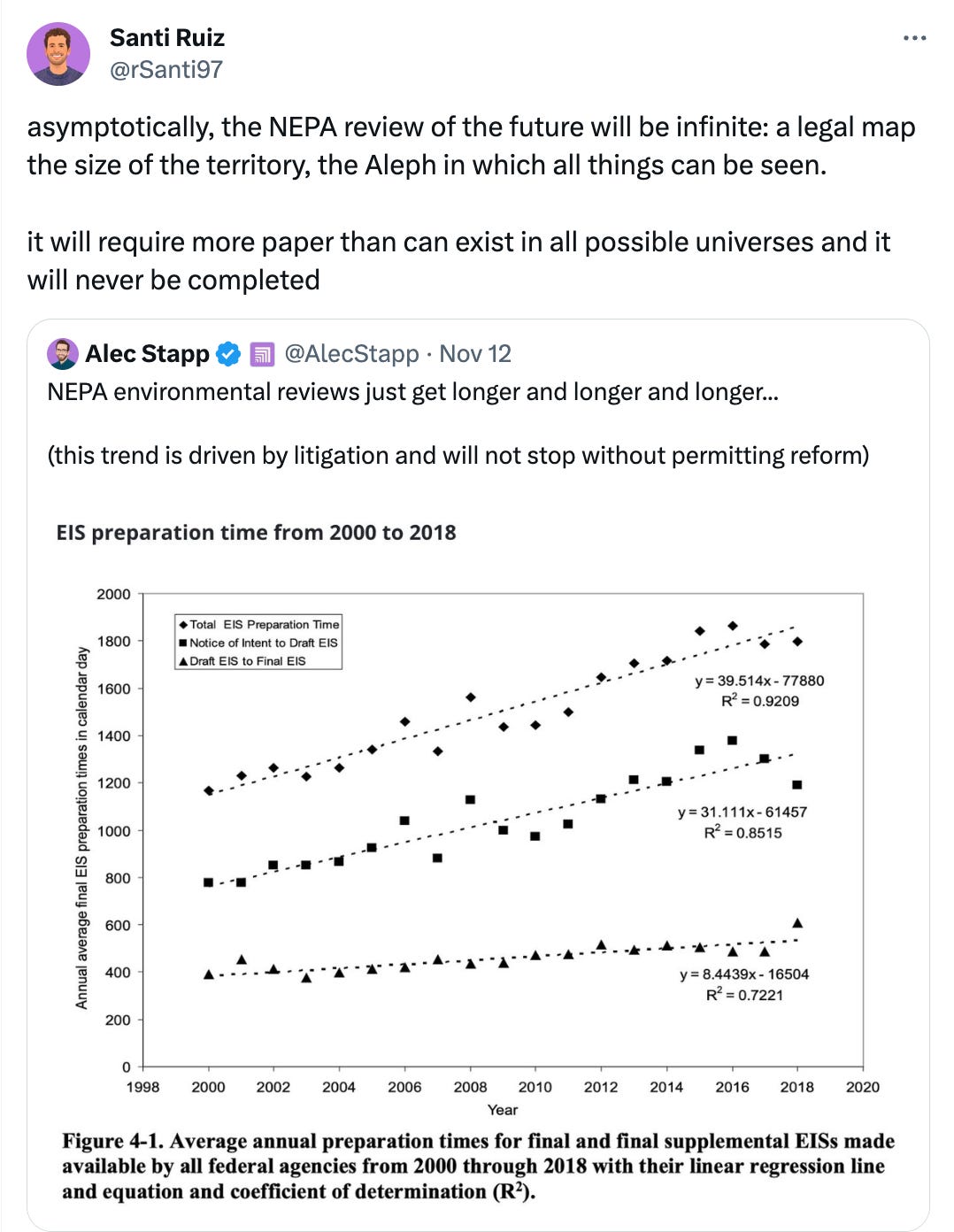Institute for Progress (IFP) — November 2023 Update
Hello!
We hope you had a wonderful Thanksgiving.
Some exciting announcements:
Vox put out its “Future Perfect 50,” a list of people “making the future a better place for everyone,” and six IFP team members made the cut: Co-founders Alec Stapp and Caleb Watney, Director of Science Policy Heidi Williams, Senior Biosecurity Fellow Nikki Teran, Senior Fellow Paul Niehaus, and board member Tamara Winter.
Amy Nice has joined our team as Distinguished Immigration Counsel, in addition to her role as Distinguished Immigration Scholar at Cornell Law. We welcomed her on board with a Statecraft interview, which you can read here.
Chad Jones is joining us as a Non-Resident Senior Fellow. He’s a professor of economics at the Stanford Graduate School of Business, noted for his research on long-run economic growth.
We’re offering our “Economics of Ideas, Science, and Innovation” course again for students who have completed at least one year of a PhD program in economics or related fields. Apply here!
You may have also noticed our website has a new domain: ifp.org is the new home for all of our projects and research.
Here’s what else we’ve been tackling this month:
✍️ Written Work
Alec wrote a piece for American Affairs, reviewing a new book by Jennifer Pahlka, on “How to Be a Policy Entrepreneur in the American Vetocracy.”
“America’s state capacity is hobbled by more than just poor implementation. We can build on Pahlka’s framework by examining the deeper forces in American political institutions that prevent new policies, such as permitting reform, from ever making it to the implementation stage.”
Our series with Employ America continues, laying out how policy can shape the future of next-gen geothermal energy.
In “How Public Policy Accelerated the Shale Revolution,” Senior Infrastructure Advisor Arnab Datta and Employ America’s Skanda Amarnath detail the muscular policy choices that made America an energy powerhouse.
In “Barriers to Next-Gen Geothermal,” Arnab, Infrastructure Fellow Aidan Mackenzie, and Employ America Policy Associate Ashley George explain why geothermal energy faces regulatory and financial roadblocks. The piece was flagged by the Financial Times.
Biosecurity Fellow Arielle D’Souza responded to a request for information from Senator Bill Cassidy, M.D. (R-LA), ranking member of the Senate Health, Education, Labor, and Pensions (HELP) Committee, on ways to reform the CDC and its practices.
Arielle also submitted a letter to leaders in Congress on PAHPA reauthorization, highlighting how the bill can be used to mitigate biosecurity risks.
Former Biosecurity Fellow Juan Cambeiro also responded to a request for information, this time from the Biomedical Advanced Research and Development Authority (BARDA), on ways Project NextGen could ensure future COVID-19 vaccine technologies bolster preparedness against future variants.
Fellow Janika Schmitt responded to a request for information from the Advanced Research Projects Agency for Health (ARPA-H), providing feedback on its Ethical, Legal, and Social Implications (ELSI) initiative.
IFP co-signed a letter urging Congress to reauthorize the Pandemic and All-Hazards Preparedness Act (PAHPA) before the end of the calendar year.
And we also co-signed a letter calling for the extension of visa interview waiver authorities that are set to expire at the end of the year.
🏗️ Construction Physics, by Senior Infrastructure Fellow Brian Potter
🏛️ Statecraft, by Senior Editor Santi Ruiz
🔭 Macroscience, by Senior Fellow Tim Hwang
A Census for Science, co-authored with Caleb
🎤 Interviews & Events
Heidi joined The Innovation and Diffusion Podcast to discuss medical innovations, incentives and disincentives, patents, exclusivities, and more.
Senior Technology Fellow Tim Hwang joined the Idea Machines podcast for a conversation on how we measure the health of scientific fields.
📰 Media
The Economist highlighted IFP’s partnership with the National Science Foundation.
“This turning of science’s methods back on itself has been dubbed “meta-science”... Dr. Myers calculates that since 2015 there have been an average of nearly 60 randomised experiments studying the scientific process. Two decades ago that number would have been in the single digits. More are coming: on September 28th the NSF announced a partnership with the Institute for Progress, a science-and-technology think-tank, to conduct metascientific experiments.”
Senator Dick Durbin (D-Ill.) was asked for his opinion on a tweet by Alec, which pointed out that "We would never have allowed the Soviet Union to own CBS, NBC, or ABC during the Cold War. But we let the Chinese Communist Party control the black box algorithm."
“I would have included it in any agenda when I sat down with President Xi, because what we have to take into consideration is that Big Tech in so many different ways is becoming a dominant force in our society and our personal lives and the lives of our families and children. We've got to be extra careful what is broadcast and information that is collected and the disinformation that is disseminated. It is a serious charge, and I certainly am suspect of these Chinese operations. I would have included it in that agenda.”

